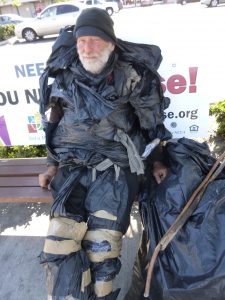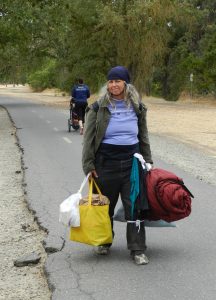
Among the most powerful myths about homelessness today, the one that claims “Government can’t help” might be the most pervasive. Despite a wealth of contradictory examples, the claim sticks to people’s minds like Velcro lint.
But the 2008 bailout of the U.S. auto industry wasn’t even the first time government has “helped” by saving thousands of jobs and entire corporations. Auto bailouts go back to 1979, when government intervened to save the Chrysler Corporation.
Government’s long history of help in the form of subsidies for agriculture gets headlines only when particularly lurid examples attract media attention, like the 1986 subsidized slaughter of dairy cows, when a Stanislaus County dairyman was among several who received millions of government dollars for killing his cows. And only government could have provided the vast water delivery system California residents and farmers today take for granted.
So why the myth that government can’t help? It’s a result of a decades-long campaign to promote anti-tax and anti-government hysteria even while government provides handsomely for those who can pony up enough bucks to buy into our pay-to-play political system.
When the Supreme Court ruled that campaign contributions constitute an exercise of the First Amendment right to free speech (Buckley vs Valeo 1976), politicians became more dependent on big donors than ever before. And well before the court ruling, none other than John Fitzgerald Kennedy had warned about the combined power of money and media to sway elections:
“It [television] can be abused by demigods, by appeals to emotions and prejudice and ignorance,” he said…If all parties and candidates are to have equal access to this essential and decisive campaign medium, without becoming deeply obligated to the big financial contributors … then the time has come when a solution must be found to this problem of TV costs.”
Prescient as he was, Kennedy could never have imagined the myth-building power of money and media once they provided big donors with the means to stack government in their favor. Today, the one thing supporters of Hillary Clinton, Donald Trump, and Bernie Sanders all agree on is that government isn’t working for most Americans.
For middle class and lower middle class people, the American dream has become a daily struggle with diminishing incomes and rising costs. Essentially disenfranchised, poor people don’t even register on the political scale.
Abraham Lincoln’s “government of the people, by the people, for the people,” is gone. It has become a government of the few, by the few, and for the few. The upward concentration of wealth in the United States has been accompanied by an upward concentration of political power.
Homelessness is an inevitable result of decades of government policies favoring the few at the expense of the many. The number of mentally ill people on our streets burgeoned after a 1980s decision to discontinue funding for the Mental Health Systems Act. It was also during the 1980s that the U.S. Department of Housing and Urban Development (HUD) became a symbol for government corruption and inefficiency:
“Housing programs established to benefit the poor were abused. During much of the1980’s, HUD was enveloped by influence peddling, favoritism, abuse, greed, fraud, embezzlement and theft. In many housing problems objective criteria gave way to political preference and cronyism, and favoritism supplanted fairness. ‘Discretionary’ became a buzzword for ‘giveaway.’”

HUD never really recovered, and a decades-long rise in housing costs has included devastating hits to the middle class in the form of outsourcing, downsizing, automation, union-busting, and a growing pool of cheap and illegal labor. Today, financial success is more closely tied to the status of one’s parents than to hard work. People born to wealthy parents are likely to become wealthy. People born poor are likely to stay poor.
Despite its reputation, America has lagged behind European countries in social mobility—the ability to move up in economic class—for decades. Hard work and the virtues of thrift, honesty, and selflessness no longer provide the benefits of shelter for millions of Americans. Instead, the poor and homeless are demonized for their failures to thrive in what has become a mythological, “land of opportunity.”
The “government can’t help” myth is routinely cited whenever poor people are involved, but if the cries for help come from Wall Street, government offers a blank check. Talk-show hosts and talking heads rave incessantly about welfare waste and “enabling” slackers, but a look at any discretionary spending pie chart shows just how little the nation sets aside for social services. Over half the budget is devoted to military spending alone.
When George W. Bush authorized a $17.4 billion bailout of Chrysler and General Motors in 2008, he issued a cautionary message about the dangers of allowing free market ideology to determine the fate of American workers:
“If we were to allow the free market to take its course now, it would almost certainly lead to disorderly bankruptcy…In the midst of a financial crisis and a recession, allowing the U.S. auto industry to collapse is not a responsible course of action…My economic advisers believe that such a collapse would deal an unacceptably painful blow to hardworking Americans far beyond the auto industry.”
Last year, Chrysler and General Motors joined Ford Motor Company in the biggest year for auto sales ever in American history. The government bailout has been paid back many times over with incomes, jobs, and security for millions of Americans.
Government, “of the people, by the people, and for the people,” can raise minimum wages and help provide affordable housing. It can help mentally ill homeless people. The myth that government can’t help has dealt “an unacceptably painful blow” to too many citizens for too long. “We the people” can and should, “promote the general welfare.”

Well, I would add- that with a better education system, the people can take some control back. Don’t expect the Government to help you- many low income folks have ‘learned to take all they can- such as the many folks who utilize our hospitals for free medical services (my wife works at a local hospital)- where the ‘uninsured (yes, they still exist) get free services and when they are discharged- they are wheeled to a brand new expensive car, with their brand new smart phones and all the extras (saying, oh, that is my boyfriends). If our education system (or our parents) taught our kids to budget properly- don’t just buy stuff on credit, save for a rainy day – put 10% away for rainy day issues, then many could avoid the issues of a sudden loss of a job or medical mishaps. Depending on the government to do it all for you is not a wise decision.
You mean those millionaire dairymen have been coming into emergency and getting free service? Don’t that beat all! We should demand our money back for buying their excess cheese and dead cows!
Here’s a comment from “Frank” in response to Mr. Woods:
“There are some, not many….unless you have data to show otherwise in both examples you site and “learned to take all they can”…….taking all they can, now how much do you think that is? Where is the data that supports your statement?
There are no ‘free’ medical services…either insurance pays, the patient pays, or the tax payer pays….Do you have any idea how many people, even though ‘covered’, still can’t afford to see a Dr, buy their meds, let alone go to a hospital?”
frank